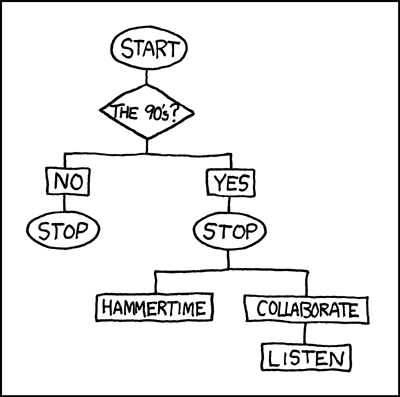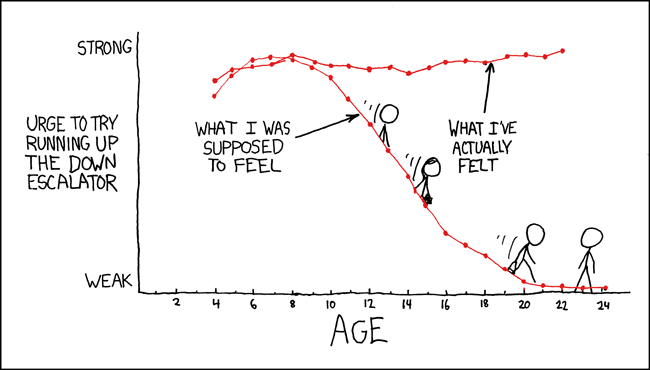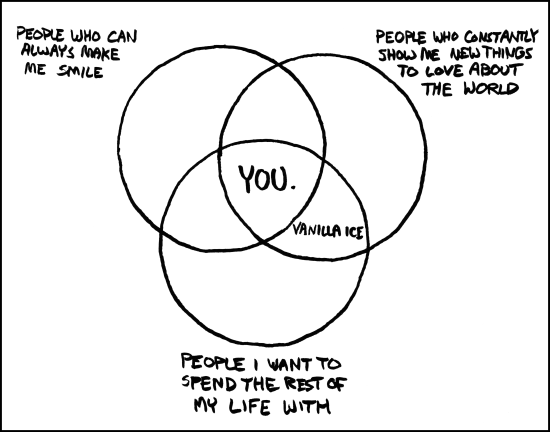every last damn thing I love about the Internet
Saturday, October 31, 2009
Sunday, October 25, 2009
Saturday, October 24, 2009
Friday, October 23, 2009
The Ten Rules
From The Telegraph, so take it with a grain of salt, per the Quex Theory: that nothing but the Internet can keep up with (and thereby correctly define) the Internet, except the Internet.
Any internet user will know that the web, like the outside world (or “meatspace”), follows certain rules. We take a look at 10, with the most well-known and widely used towards the top and some of the lesser lights lower down. If you know any more, let us know below.
Equally, of course, if you have formulated one yourself, do likewise – but you might want to include your real name, not just a web pseudonym. Otherwise it will be known forever as Gherkin555’s Law, or whatever, and you will miss your shot at posterity. We should state that we are not endorsing these laws or the views they imply, merely reporting them.
1. Godwin’s Law
The most famous of all the internet laws, formed by Mike Godwin in 1990. As originally stated, it said: "As a Usenet discussion grows longer, the probability of a comparison involving Nazis or Hitler approaches 1." It has now been expanded to include all web discussions.
It is closely related to the logical fallacy “reductio ad Hitlerum”, which says “Hitler (or the Nazis) liked X, so X is bad”, frequently used to denigrate vegetarians and atheists.
Common Godwin's Law appearances include describing women's rights campaigners as “feminazis”, comparing the former US President George W Bush to Hitler, or saying Barack Obama's proposed healthcare reforms are the new Holocaust.
In its broader sense it can be used to describe any situation where a poster loses all sense of proportion, for example describing New Labour as “Zanu-Labour” after Robert Mugabe’s Zimbabwean political party Zanu-PF.
As well as the descriptive form, it can be used prescriptively: so if any poster does mention the Nazis in a discussion thread, Godwin’s Law can be invoked, they instantly lose the argument and the thread can be ended.
If this is done deliberately to end the argument, however, it does not apply. This codicil is known as “Quirk’s Exception”.
2. Poe’s Law
Not to be confused with the law of poetry enshrined by Edgar Allen Poe, the internet Poe’s Law states: “Without a winking smiley or other blatant display of humour, it is impossible to create a parody of fundamentalism that someone won't mistake for the real thing.”
It was originally formulated by Nathan Poe in 2005 during a debate on christianforums.com about evolution, and referred to creationism rather than all fundamentalism, but has since been expanded.
Poe’s Law also has an inverse meaning, stating that non-fundamentalists will often mistake sincere expressions of fundamentalist beliefs for parody.
Examples abound – one particularly difficult-to-judge site claims that “Heliocentrism [the belief that the Earth orbits the Sun, rather than the other way around] is an Atheist Doctrine”.
One that must, surely, be a parody is sexinchrist.com (WARNING: link contains adult material), a site that offers Christians advice on the rights and wrongs of such activities as threesomes and pubic shaving, among much more.
However, it is hard to be entirely certain, given the existence of christiannymphos.org (WARNING: link contains adult material), an apparently entirely serious site.
Here is an example of a parody site that embodies both Godwin's and Poe's Laws.
3. Rule 34

States: “If it exists, there is porn of it.” See also Rule 35: “If no such porn exists, it will be made.” Generally held to refer to fictional characters and cartoons, although some formulations insist there are "no exceptions" even for abstract ideas like non-Euclidean geometry, or puzzlement.
For obvious reasons it is not appropriate for lengthy discussion in a family newspaper, but the recent appearance of Marge Simpson on the cover of Playboy, pictured above, was a (very mild) example of the law in action, and going mainstream.
The spread of fanfic, slash fiction and hentai around the internet, as well as the rise of furries, are making this law more and more accurate every day.
The other 33 rules change frequently, except one and two, which are “Do not talk about /b/” and “Do NOT talk about /b/”, respectively, referring to a message board on the 4chan.org website.
4. Skitt’s Law
Expressed as "any post correcting an error in another post will contain at least one error itself" or "the likelihood of an error in a post is directly proportional to the embarrassment it will cause the poster."
It is an online version of the proofreading truism Muphry’s Law, also known as Hartman's Law of Prescriptivist Retaliation: "any article or statement about correct grammar, punctuation, or spelling is bound to contain at least one eror".
Language Log quotes the following example, from Paul Ordoveza’s How Now, Brownpau? blog:
"For too long, we linguistic pedants have cringed, watching this phrase used, misused, and abused, again, and again, and again. 'This begs the question...' [we hear], and we must brace ourselves as the ignoramii of modern society literally ask a question after the phrase."
While Mr Ordoveza’s point is entirely valid (“begging the question” is a logical fallacy, meaning to "beggar the question", or assume your conclusion in your premise – not to raise the question), the plural of ignoramus is ignoramuses.
It was apparently first stated by G Bryan Lord, referring to a user named Skitt, on Usenet in 1998.
5. Scopie’s Law
States: “In any discussion involving science or medicine, citing Whale.to as a credible source loses the argument immediately, and gets you laughed out of the room.” First formulated by Rich Scopie on the badscience.net forum.
This law makes little sense without a background knowledge of Whale.to, a conspiracy theory site which includes such items as the complete text of the anti-Semitic hoax Protocols of the Elders of Zion, as well as claims that Aids is caused by vaccination programmes, and that Auschwitz never happened.
It has been expanded by posters on rationalwiki.com to include any use of Answers in Genesis in an argument about creationism and evolution.
6. Danth’s Law (also known as Parker’s Law)
States: “If you have to insist that you've won an internet argument, you've probably lost badly.” Named after a user on the role-playing gamers’ forum RPG.net.
Danth’s Law was most famously declared in “The Lenski Affair”, between microbiologist Richard Lenski and the editor of Conservapedia.com, Andrew Schlafly, who cast doubt upon Prof Lenski’s elegant experimental demonstration of evolution.
After what is widely held to be one of the greatest and most comprehensive put-downs in scientific argument from Prof Lenski, Mr Schlafly declared himself the winner.
7. Pommer’s Law
Proposed by Rob Pommer on rationalwiki.com in 2007, this states: “A person's mind can be changed by reading information on the internet. The nature of this change will be from having no opinion to having a wrong opinion.”
8. DeMyer's Laws
Named for Ken DeMyer, a moderator on Conservapedia.com. There are four: the Zeroth, First, Second and Third Laws.
The Second Law states: “Anyone who posts an argument on the internet which is largely quotations can be very safely ignored, and is deemed to have lost the argument before it has begun.”
The Zeroth, First and Third Laws cannot be very generally applied and will be glossed over here.
9. Cohen’s Law
Proposed by Brian Cohen in 2007, states that: “Whoever resorts to the argument that ‘whoever resorts to the argument that... …has automatically lost the debate’ has automatically lost the debate.”
Has also been stated in the much longer version, "Whoever resorts to the argument that 'whoever resorts to the argument that... 'whoever resorts to the argument that... 'whoever resorts to the argument that... 'whoever resorts to the argument that ... 'whoever resorts to the argument that... ...has automatically lost the debate' ...has automatically lost the debate' ...has automatically lost the debate' ...has automatically lost the debate' ...has automatically lost the debate' has automatically lost the debate.
10. The Law of Exclamation
First recorded in an article by Lori Robertson at FactCheck.org in 2008, this states: "The more exclamation points used in an email (or other posting), the more likely it is a complete lie. This is also true for excessive capital letters."
It is reminiscent of the claim in Terry Pratchett's Discworld novels that the more exclamation marks someone uses in writing, the more likely they are to be mentally unbalanced.
According to Pratchett, five exclamation marks is an indicator of "someone who wears their underwear on the outside".The Noosphere is growing. :D
Labels:
awesome,
Internet Evolution
Thursday, October 22, 2009
Does not equal zero.
Garfield minus Garfield, gets my love because it wasn't some one person's idea. F*cking around with Garfield strips was, actually, an early Internet meme.
Fun Fact: I used to live next to Jim Davis's brother. :/
Fun Fact: I used to live next to Jim Davis's brother. :/
Tuesday, October 20, 2009
Monday, October 19, 2009
Four Panels
Damnitall, I'm looking for the one yonkoma where the dapper fellow in a top hat and white gloves takes a sip of his espresso, insert something ridiculous in panel three, and then he does a spit-take. I found these, instead:
Somebody, anybody, please help me find tophat guy.
Somebody, anybody, please help me find tophat guy.
Labels:
trek,
WTF,
yonkoma や 4 panels
Sunday, October 18, 2009
ピタゴラスイッチ
A Japanese equivalent to Sesame Street, sans the hairy monsters and annoying voices, Pitagora Suicchi (Pythagoras Switch) is the most spellbinding children's show I have ever seen. Tucked amongst the show's short segments of video, music, and animation, there are the famous Rube-Goldberg-style setups that utilize a variety of simple machines and household items to accomplish the task of presenting the show's name in a fascinating manner. Some examples:
The Pitagora rigs are so endearing that fans all across Japan -- and around the world -- often devise their own systems and record their successes (and failures) to share on the Internet. Search for "pythagoras switch" or "pitagora suichi" on YouTube to find a wide variety of fan homages to the show.
Labels:
awesome,
Japanese TV
Thursday, October 15, 2009
Tuesday, October 13, 2009
Simplicity holds the reigns of comedy.
Webcomics remain one of meh favorite parts of the whole Internet. All the craziness that no newspaper would ever print gets out and stays where you can link to it forever and ever. :D
You might have seen the work of Randall Munroe somewhere online before. If not, then I am sorry for you; here's some of it.
As with XKCD, this also is hilarious, albeit in a more analogue way:
Fussy Turtle would be a great name for an indie band.
You might have seen the work of Randall Munroe somewhere online before. If not, then I am sorry for you; here's some of it.
As with XKCD, this also is hilarious, albeit in a more analogue way:
Fussy Turtle would be a great name for an indie band.
Labels:
webcomics,
White Ninja,
xkcd
Saturday, October 10, 2009
New Discovery
In hindsight, I kinda wish I hadn't discovered it... behold, People of Walmart.
They don't sell eye bleach at Walmart.
Disclaimer: Pictures come from www.peopleofwalmart.com, and are the property of their respective submitters. I have nothing against elderly transgendered people, fat people who dress in clothes that are waaaay too small for them, pet monkeys, or people who like to advertise their opinions on their cars. I do, however, think they are all hilarious.
They don't sell eye bleach at Walmart.
Disclaimer: Pictures come from www.peopleofwalmart.com, and are the property of their respective submitters. I have nothing against elderly transgendered people, fat people who dress in clothes that are waaaay too small for them, pet monkeys, or people who like to advertise their opinions on their cars. I do, however, think they are all hilarious.
Labels:
WTF
Wednesday, October 7, 2009
Monday, October 5, 2009
Sunday, October 4, 2009
Thursday, October 1, 2009
Subscribe to:
Comments (Atom)




















































